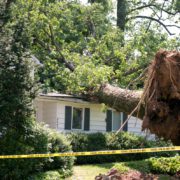All About Sinkhole Insurance for Homeowners
Attention, homeowners! As if you didn’t have enough to worry about what with hurricanes, floods, earthquakes, firestorms and mudslides, you can add sinkholes to your concerns. Florida is infamous for them, but sinkholes can and do happen throughout the U.S. The most important thing you need to know is whether and under what conditions your homeowners insurance covers sinkholes damage.
According to the United States Geological Service (USGS) website sinkholes come in two types: man-made and naturally occurring collapse.
- Man-made sinkholes are typically a result of land-use practices such as groundwater pumping and changes in natural water drainage patterns during construction and development.
- Natural collapse sinkholes happen where subsurface rock is limestone, carbonate, salt bed or some other rock that is easily dissolved when ground water flows through it. Caverns and voids develop, eventually caving in dramatically when they get too big to support the land or structures above them.
Man-made sinkholes can occur anywhere. The most damaging collapse sinkholes are most prevalent in Florida, Texas, Alabama, Missouri, Kentucky, Tennessee and Pennsylvania, according to the USGS.
The good news for most U.S. homeowners is that your standard HO3 policy, the most popular homeowners insurance, protects your home from all perils except those specifically excluded. And as a rule, sinkholes aren’t excluded. (Of course, if you live in a sinkhole-prone area, you should read your homeowners policy just to be sure you’re covered. If not, you can purchase a rider to include sinkhole coverage.)
The bad news is that since 2009, private insurers in Florida no longer have to automatically include sinkhole coverage in homeowners policies. Instead, if you want it or your mortgage lender requires it, you must buy it as a rider, often at a stiff premium. In some areas, including Pasco County, the so-called “Sinkhole Capital of the World,” homeowners have had their sinkhole policies automatically dropped. In those instances, there is a government insurance option available.
Florida insurers justify the policy drops and escalating premiums because of a surge in claims, including a high number of frivolous ones. A November 2010 report by Florida insurance regulators said that the average closed sinkhole claim exceeds $140,000, yet less than half of the money paid out in claims over the past five years has been used to fix damaged foundations or fill-in sinkholes. Instead, according to a recent article in the Wall Street Journal, the claim awards are being used to pay down mortgages.
If you have a sinkhole on your property, you should contact your insurer and have it inspected by an adjuster. Sinkhole.org recommends that you rope off the area, contact your insurer and, if necessary, your local emergency management organization. Whatever you do, don’t ignore the problem. It will never get better. Only more damaging and potentially life-threatening. And again, do check if your homeowners insurance cover sinkholes before you apply.

 EINSURANCE
EINSURANCE EINSURANCE
EINSURANCE EINSURANCE
EINSURANCE EINSURANCE
EINSURANCE